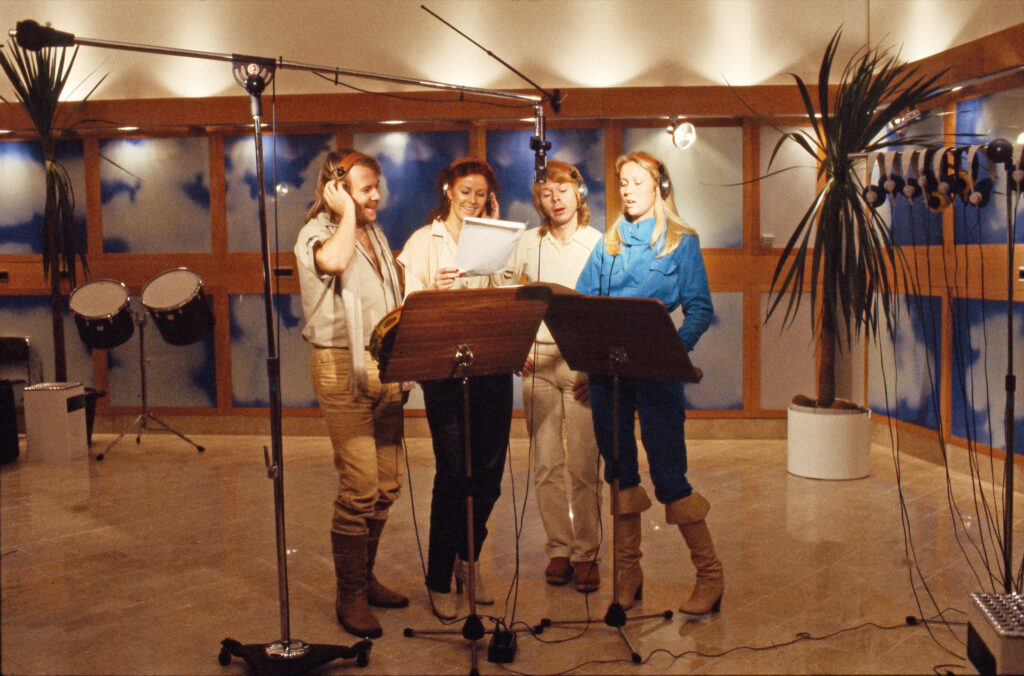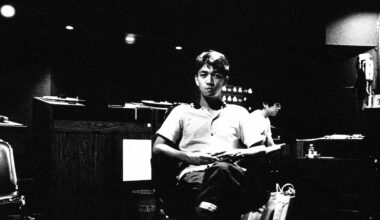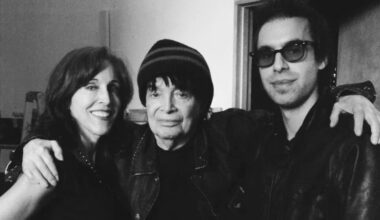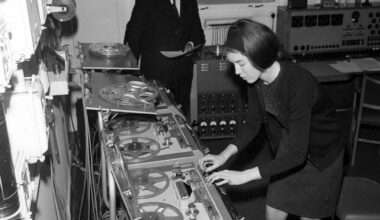ABBA may well be best known as Sweden’s worst-dressed but best-selling exporters of the 1970s, but Benny Andersson was also a bona fide synth pioneer. Don’t believe us? Read on…
Mention ABBA and what springs to mind? Dancing at weddings? The ‘Mamma Mia!’ musical? The 70s? The Eurovision Song Contest? Synth pioneers? Hold it right there… Synth pioneers?
In the revised and expanded new edition of ‘ABBA The Complete Recording Sessions’, Carl Magnus Palm, the world’s leading ABBA historian, reveals that while keyboard player Benny Andersson didn’t seem especially fussed about electric or grand pianos, playing whatever was available for recording session work, he was really interested in latest tech, and from very early on in the band’s career he began to assemble a personal synth stockpile that would go on to shape the distinctive ABBA sound.
The first instruments he bought were bagged on the same shopping trip to London in 1973. While it’s unclear when the spending spree actually was, Benny snapped up a Mellotron M400 and a Minimoog. Which is quite the haul, right? The M400 appears on the band’s debut album, ‘Ring Ring’, featuring on the the title track and ‘Another Town, Another Train’, which was no mean feat considering the record was released in March 1973. It was plain he was itching to use his new acquisition, although it is strange that he was also packing a Minimoog and yet there’s no sign of that on recordings until the following year.
While the M400 went on to appear on ‘Hasta Mañana’, ‘Dance (While The Music Still Goes On)’, and ‘Gonna Sing You My Lovesong’ from the band’s second album, ‘Waterloo’, released in March 1974, would be the final outing for the machine, with Andersson going on to describe its sound as “shrill” and “ugly”. Still, if it was good enough for The Beatles, who used the Mellotron for the intro to ‘Strawberry Fields Forever’, it certainly did a job, albeit a short-lived one, for ABBA.
The Minimoog faired much better. Inspired like many others to buy one after hearing Hot Butter’s ‘Popcorn’, it is the most frequently used synth on ABBA recordings from its debut on the ‘Waterloo’ album right up to the end of their wildly successful career in 1982.
According to Benny it was “the best synthesiser, because it’s got its very own sound, soft and musical”. It’s much in evidence on that first outing. From the thumping intro to the title track, the solo on ‘Honey Honey’, following the bassline on ‘What About Livingstone’ and helping beef up the soon to be redundant Mellotron on ‘Gonna Sing You My Lovesong’, the Minimoog was all over ‘Waterloo’ and it was apparent Benny had found a new weapon of choice.
“I actually don’t know so much about the technical side of it,” he explained in 1979. “In the beginning I would simply sit and turn the knobs until I got a sound I liked. Now I’m starting to learn roughly how to get different sounds, and as long as I know what I want I can produce them pretty quickly. But during the first years I think Michael [Tretow, their long-time sound engineer/producer] and Björn suffered quite a lot while I was fooling around with the knobs.”
It’s quite remarkable that it was only in 1979, some six years after he bought the Minimoog, that he felt he was beginning to learn how it worked! It was around this time that he acquired the “dream machine”, the prog rock big gun, the Yamaha GX-1. Weight 600lbs, the triple keyboarded beastie came ready mounted on its own platform complete with stool. Keith Emerson owned two, of course, until one was run over by a runaway tractor… but we digress. Benny first clocked the GX-1 in the hands of Led Zeppelin’s John Paul Jones in September 1978 while recording ‘In Through The Out Door’ in Stockholm. ”I thought, ‘What the hell is that?” he recalls. The GX-1 was made in very limited numbers between 1973 and 1977, but Benny would lay his hands on one with the help of Yamaha’s European office, using it for the first time in March 1979. “I created my first sound as soon as I got it,” he says, “the bass synthesiser you hear at the start of ‘Does Your Mother Know’.
Then I thought, ‘Worth every penny!’”
We caught up with author Carl Magnus Palm to see if he could shed any further light on Benny’s synth obsession.
The new edition of ‘ABBA The Complete Recording Sessions’ has been completely rewritten and contains a mountain of new information, what are the main new discoveries?
CMP: There are plenty of new discoveries, as I’ve been able to listen to much more unreleased material than I was able to back in the 1990s for the first edition. It’s been especially interesting hearing every surviving alternate mix in the archives, because it allows you to study how a song would evolve and how they would add overdub after overdub – usually in the shape of Benny’s synths! In the book he explains how they would overdub a lot using the Minimoog – tiny snippets, phrases and riffs that they would interweave into songs. He’d also use it to “amplify” other instruments by playing the same part again on the Minimoog. He said by doing that it gives you a much fatter sound!
Benny didn’t seem overly fussed about his pianos, but he clearly loved the Mellotron and Minimoog didn’t he?
CMP: He did. He said in an interview as early as 1974 that “electronic sounds are the future, even in pop music made for a wide audience”. He would have said that around the time of ‘Waterloo’.
What do you think he liked about synths in particular?
CMP: I think he was attracted by the possibility of the almost endless variations, enabling him to create sounds that didn’t exist. With the Mellotron, I think he liked that it would enable him to be an “orchestra” himself. It is sometimes referred to as an early version of the sampler, it stored authentic recordings of flutes, strings and other instruments and since it was possible to play chords on the Mellotron it enabled a keyboard player to emulate, for example, a string section. Although because of its somewhat wobbly tone it rather tended to create a sound unique to the Mellotron itself!
Would you say that it was these kinds of instruments that shaped the ABBA sound more than anything else?
CMP: If we’re talking about the instrumental side only, forgetting Agnetha and Frida’s vocals for a minute, Benny’s keyboards were definitely the basis of the ABBA sound: piano as well as synthesisers and other electronic keyboards.
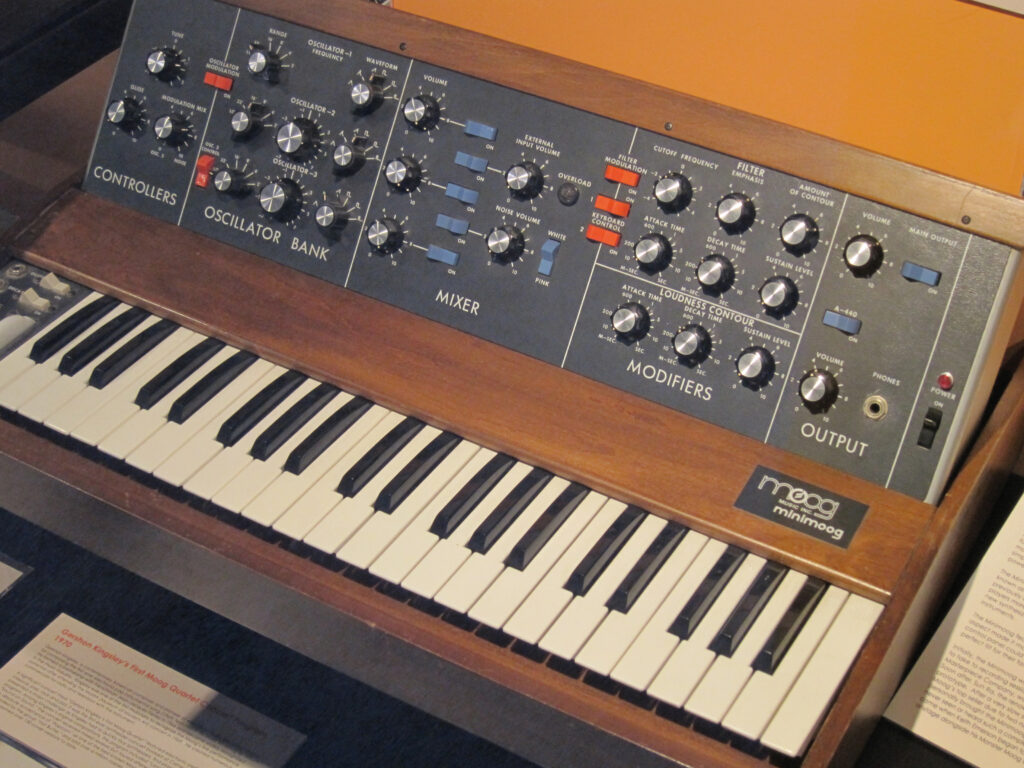
Besides the Mellotron and Minimoog, what else did he have up his sleeve?
CMP: He was always keen to keep up with the latest synths, and it seems he was a very early adopter of the Polymoog, for instance. Even he doesn’t quite recall which synths he used, but there is evidence he used the Prophet-10 and the Yamaha GS-1 on some of the final ABBA recordings in 1982. His greatest love affair, however, was with the Yamaha GX-1, which he acquired in March 1979 and first used for the bass synth intro on ‘Does Your Mother Know’. He had acquired cartridges with Led Zeppelin’s John Paul Jones’ string programme for the GX-1, and he preferred that sound to live strings, so from 1980 onwards, and with ‘The Winner Takes It All’ as the only exception, ABBA never used live strings on their recordings again. The last gadget he bought was the Synclavier back in the 1980s – after that, he says, he just couldn’t be bothered reading any more manuals.
He was a pretty early adopter wasn’t he? Do you think he gets the credit he deserves as a synth pioneer?
CMP: I don’t think he does. I know there are connoisseurs out there who appreciate what he’s done, but because of the poppy nature of ABBA’s records I don’t think people notice the synths so much. Also, Benny’s use of the synths was often more AOR than the futuristic style we associate with the likes of Giorgio Moroder or Kraftwerk, so perhaps that’s another reason he isn’t held up as a pioneer.
What do you consider the best examples of the Minimoog on ABBA records?
CMP: The intro to ‘Gimme! Gimme! Gimme! (A Man After Midnight)’, famously sampled by Madonna in ‘Hung Up’, for example. I also like the staccato riffing on ‘Lay All Your Love On Me’, which was played completely manually. Also some more obscure early tracks, particularly on the ‘Waterloo’ album, where there’s a lot of that early super-electronic synth sound, less polished than what would follow. So there’s the very brief synth solo on ‘Honey, Honey’; the squealy sounds on ‘Watch Out’, which is a song Benny and Björn both loathe, and the whiny tones on ‘Gonna Sing You My Lovesong’. I love hearing Benny in this experimental mode.
I notice in the very back page of the book there’s a quote from Michael Tretow – “I’ve had enough of the Moog now”. Would you care to elaborate?
CMP: The original quote, “Nu har jag fått noog av Moog” is a play on words, as the Swedish word for “enough” rhymes with “Moog”. But there was some truth behind the joke, as Michael would be pulling his hair out in frustration at Benny’s interminable synth overdubs. They only had 24 tracks back then and those tracks would be filled up quickly, meaning that Michael had to mix several tracks down to one track to free up more tracks for Benny’s synths. Benny would never give up, there was always a new idea he wanted to try out.
‘ABBA: The Complete Recording Sessions’ by Carl Magnus Palm is published by CMP Text
